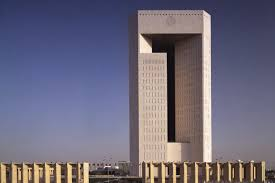
Sagamite is a bachelors graduate from one of the UK’s elite universities after an early life in Nigeria. He is an experienced management consultant that has worked with firms in a diverse range of industries both in public and private sector. His experience provides him with a catalogue of versatile and arcane knowledge. His current interests include logical structure of opinions/arguments, entrepreneurship and human psychology. He prides himself on his organic, objective and independent thinking, so the audience should expect a significant number of his articles to be contra-popular belief. He is one of Nigeria’s leading objective-Contrarian thinkers about life’s generally accepted conventional wisdom****
One of the major challenges restraining the economic growth of Africa is lack of infrastructure.
Lack of infrastructure is an inhibitor of economic activities, increases the cost of modern living and discourages foreign investment. All these lead to a society with fewer jobs and citizens living harder lives.
Many African countries have too small a national budget to develop the economic infrastructural needs that can enable them reach the level required to reach an emerging economy level, yet these small budgets are being wasted. Much of it is being looted through inflated contracts, shoddy work or outright stealing.
Any leader with the best intentions would struggle to stop this looting and waste as the corruption is strongly woven into majority of African society and the mentality of the people. Those given the responsibility to monitor and access work frequently are happy to take something in and envelope and help with the looting.
In the UK, it is estimated that roughly about 6% of infrastructural work involves corruption. The day I heard that, I was thinking if that is the level in the UK, what would be the level in Nigeria? This is the point I expect many of you to do the sign of the cross on your upper body.
These reminds me of when Nigeria wanted to host the FIFA U-17 world cup in 2009 and the Local Organising committee, led by Mainasara Iloh, took a budget of 35.5bn Naira to the Nigerian government to fund it. This was what they stated was required for hosting the tournament. When the Yaradua government turned this down and said it was way too much money for the government to spend on such a youth competition, the Local Organising Committee (LOC) was forced to review the required budget and then came back with a 9.5bn Naira figure. This the government approved and the tournament was hosted perfectly well, without any hiccups.
So this just gives you the idea of how much the LOC intended to loot from the opportunity of organising this tournament. The same Mainasara Iloh is one of the names being touted to replace the current President of the NFF. …………Please do the sign of the cross again.
Now back to the infrastructural development challenges. I think any good government has to find a way of beating corruption by tying down future outcomes of the infrastructure with the finance of bidders.
For example, in the UK, any major infrastructural development like rails, motorway, major buildings, airport etc to be built are expected to be built to a standard that requires it lasts 60 years before it needs to be replaced by a new one. It can be improved and maintained during these years but its design and use must be able to meet the current and future requirements for up to 60 years.
In Nigeria, many projects like that hardly can meet the nation’s needs 20 years after it is built. And that is if the public is lucky. Major overhaul tend to be required less than 3 years later.
I think for any good intention government to reduce the risk of these kinds of corruption, there should be a review of the way contracts are awarded. I would suggest that in future, the cost of the contract, apart from being benchmarked against the standard cost in countries with low corruption index, should:
1) Include a cost for maintenance to a specified standard over the first 5 years. That is, the contract winner should be liable for any maintenance and repairs at an average cost of maintenance of similar roads in a select list of low corruption countries. So if anything goes wrong, the contractor should be held responsible for breaking the road back to the high standards without any additional cost to the government.
2) All such contracts should be made to last 50 years+ with all bid winners responsible for any major overhaul during this period. These bid winners should be made to get insurance or corporate guarantor to cover any risk of their inability to meet this requirement. Hence if a bidder wins a contract and after 10 or so years, the road does not perform or live up to the standard stated in their bid, then they are liable to any cost of bringing it up to that level or their insurers/guarantors are liable for this. Passing risks to insurance firms like this would indirectly help clean up the construction industry as the insurers would only insure construction firms with strong reputation for high quality work.
Established in March 2013, JarusHub is a Nigerian information hub with focus on career and management. It is rated Nigeria's most authoritative destination for online career resources. It parades an array of Nigerian professionals who share their career experiences with a view to bridging career information gap and mentoring a generation to success. Whether you're a student, a recent graduate or an established professional, or even an executive, you will always find something to learn on JarusHub. All enquiries to jarushub@gmail.com or 0808 540 4500. Facebook: www.facebook.com/jarushub; Twitter: @jarushub or @mcjarus.
Attend JarusHub’s 2024 Seplat Assessment Center Coaching
October 29, 2024
Let us have your say by leaving a comment belowCancel reply
Recommended For You
-
QUESTIONS & ANSWERS WITH FEMI AWOYEMI, CEO, PROSHARE NIGERIA
October 2, 2014 -
OIL & GAS: HOW TO GET A JOB IN SHELL
October 28, 2014
© Copyright JarusHub. All Rights Reserved.






